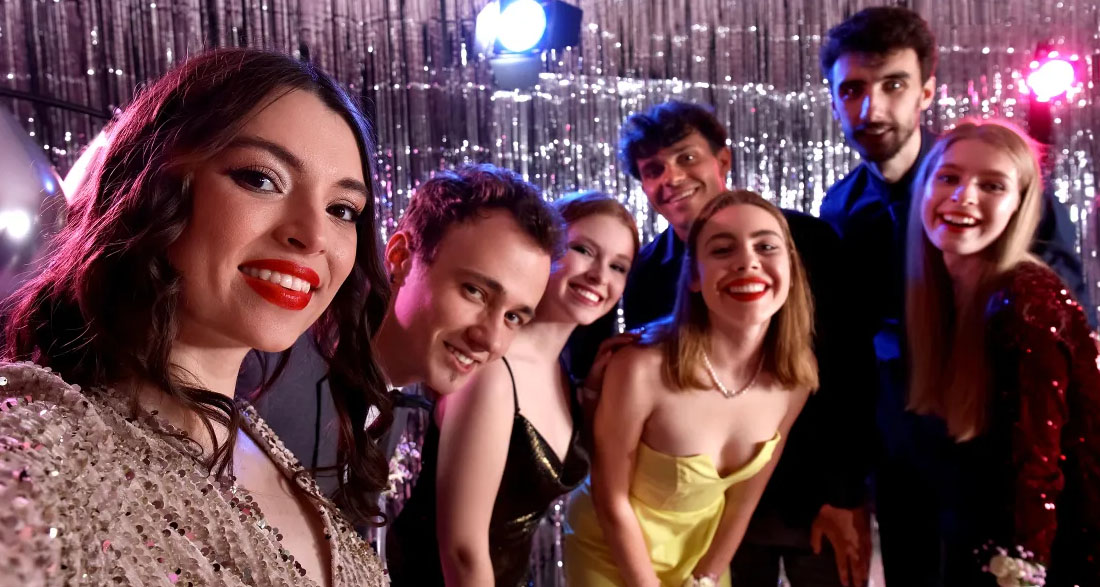Prom Night Betrayal: A Grandmother’s Cruel Words Caught on Tape
Emma and Lily grew up together in our home—two bright, beautiful girls who might not share blood but were sisters in every way that mattered. My husband and I made sure they were treated equally: same rules, same love, same chances.
But there was one person who never played fair—Carol, my mother-in-law.
From the beginning, Carol doted on Lily, her biological granddaughter, while treating Emma like an afterthought. I kept hoping she’d change, that time would soften her heart.
Then came prom night.
Both girls were seniors, both glowing with excitement. I planned to hire a professional videographer, but Carol surprised me.
“Oh, please,” she said, waving her hand. “I have a great camera, and I want to do this for my granddaughters.”
My granddaughters. Plural. For the first time, she included Emma.
I thought we’d finally turned a corner.
Prom night was magical. The girls looked stunning—Lily in a sparkling blue gown, Emma in a deep red dress that made her look like a movie star. Carol even brought cupcakes, each decorated with their names. It felt like a dream.
A week later, we gathered to watch the video.
“A prom to remember!” Carol announced, grinning as she pressed play.
At first, everything was perfect. The camera focused on Lily, capturing every twirl, every laugh. Carol’s voice was full of pride.
“She looks so beautiful,” she whispered, her voice trembling with emotion.
Lily’s smile lit up the screen as she posed with her date.
“That’s my girl,” Carol murmured.
Then… Emma appeared.
The camera suddenly jerked downward, as if Carol had lost interest. All we saw was the edge of her purse.
And then her voice—cold, dismissive.
“Oh, here comes the other one. Shame she insists on that hairstyle. Looks like she didn’t even try.”
My stomach dropped.
The room went dead silent.
I turned to Carol, but she was frozen, her face pale.
The video kept playing—Lily in perfect focus, Emma barely in frame. When the girls posed together, Carol’s voice cut through again.
“Perfect, sweetheart,” she cooed—but only when Lily was on screen.
Then, my voice, off-camera: “Carol, are you getting Emma too?”
Her reply was sharp. “Oh… I thought I pressed record.”
Emma stood up, her face blank.
“Emma, wait—” I started.
“I’m fine,” she said, but her voice cracked.
Lily looked devastated. My husband’s jaw clenched so tight I thought his teeth might break.
I walked to the TV, pulled out the memory card, and held it out to Carol.
“You don’t deserve to hold memories of this day.”
Carol gasped. “It was a mistake! I must’ve pressed the wrong buttons—”
“No,” I snapped. “You didn’t ‘forget’ to film Emma. You made sure everyone heard how you really feel.”
She stammered, searching for an excuse—but then Lily spoke, her voice shaking with anger.
“I’m ashamed of you, Grandma. Emma’s more of a sister to me than anyone. You don’t get to treat her like this and still call yourself family.”
Carol’s face went white.
“Lily, honey, you don’t understand—”
“I understand perfectly,” Lily shot back. “Emma was happy, and you ruined it.”
My husband finally spoke, his voice low and firm. “Mom, I think you should leave.”
Carol grabbed her purse and stormed out, probably expecting someone to chase after her.
No one did.
Days later, the girls came home with matching silver bracelets. “Chosen Sisters,” the engraving read.
“We picked each other,” Emma said, smiling for the first time since that night. “That means more than biology.”
Carol tried to fix things—texted apologies, left a jewelry box on our porch, even showed up begging for forgiveness.
“Tell her I’m sorry,” she pleaded.
We left the gift outside.
Then, one day, she came back, looking broken.
“I don’t know why I did it,” she admitted, tears in her eyes. “I think… I was still grieving Lily’s mom. I told myself Emma wasn’t really family. But the truth is, I was jealous. Jealous of how close they are. Emma has everything I wish Lily had—kindness, strength. Instead of loving her, I pushed her away.”
We told her we needed space.
A few days later, a handwritten note slid under our door.
“I hope one day you’ll allow me to know the young woman I never gave a fair chance.”
Emma read it quietly. “What should I do?” she asked.
“What do you want to do?” I replied.
She didn’t answer—but she didn’t throw the note away.
Eventually, she agreed to see Carol again—on her own terms. No fake affection. No cameras. No empty promises.
When Carol arrived, she was different—quieter, humbler. She actually listened as Emma talked about her dreams, her life.
“I didn’t know you wanted to be a teacher,” Carol said softly.
“There’s a lot you don’t know about me,” Emma replied.
Carol nodded. “I’d like to learn. If you’ll let me.”
This isn’t a happy ending. Not yet. Forgiveness takes time. But for the first time in years, there’s hope.
Some families are bound by blood. Others by choice. Ours? We’re learning to be bound by both.
And that’s enough—for now.

